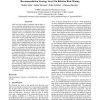Free Online Productivity Tools
i2Speak
i2Symbol
i2OCR
iTex2Img
iWeb2Print
iWeb2Shot
i2Type
iPdf2Split
iPdf2Merge
i2Bopomofo
i2Arabic
i2Style
i2Image
i2PDF
iLatex2Rtf
Sci2ools
128
click to vote
PAAPP
2007
2007
Relation rule mining
\Web users are nowadays confronted with the huge variety of available information sources whose content is not targeted at any specific group or layer. Recommendation systems aim at adapting this content to (their guesses about) the needs of a particular user and hence usually compute some sort of relevance score of the manipulated content objects. As direct information about user needs is scarce, content objects are assessed not directly with respect to those needs but rather in relative manner, i.e., as compared to other objects whose relevance is known. The likeness indices for objects vary from association degrees computed from user logs to inter-object similarities to aggregations of direct user votes on object relevance. We claim that as structured content descriptions, i.e., by means of an ontology, get ever more popular among information providers on the Web, the underlying domain knowledge may successfully be exploited in comparing objects for recommendation purposes. In thi...
Related Content
| Added | 27 Dec 2010 |
| Updated | 27 Dec 2010 |
| Type | Journal |
| Year | 2007 |
| Where | PAAPP |
| Authors | Mehdi Adda, Rokia Missaoui, Petko Valtchev |
Comments (0)

